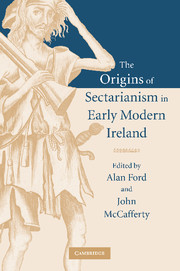Book contents
- Frontmatter
- Contents
- Preface
- List of contributors
- List of abbreviations
- 1 Living together, living apart: sectarianism in early modern Ireland
- 2 Confessionalisation in Ireland: periodisation and character, 1534–1649
- 3 Protestant prelates or godly pastors? The dilemma of the early Stuart episcopate
- 4 ‘In imitation of that holy patron of prelates the blessed St Charles’: episcopal activity in Ireland and the formation of a confessional identity, 1618–1653
- 5 A haven of popery: English Catholic migration to Ireland in the age of plantations
- 6 The Irish historical renaissance and the shaping of Protestant history
- 7 Religion, culture and the bardic elite in early modern Ireland
- 8 The political and religious thought of Florence Conry and Hugh McCaughwell
- 9 Sectarianism: division and dissent in Irish Catholicism
- 10 Purity of blood and purity of faith in early modern Ireland
- 11 Concluding reflection: confronting the violence of the Irish reformations
- Index
7 - Religion, culture and the bardic elite in early modern Ireland
Published online by Cambridge University Press: 24 November 2009
- Frontmatter
- Contents
- Preface
- List of contributors
- List of abbreviations
- 1 Living together, living apart: sectarianism in early modern Ireland
- 2 Confessionalisation in Ireland: periodisation and character, 1534–1649
- 3 Protestant prelates or godly pastors? The dilemma of the early Stuart episcopate
- 4 ‘In imitation of that holy patron of prelates the blessed St Charles’: episcopal activity in Ireland and the formation of a confessional identity, 1618–1653
- 5 A haven of popery: English Catholic migration to Ireland in the age of plantations
- 6 The Irish historical renaissance and the shaping of Protestant history
- 7 Religion, culture and the bardic elite in early modern Ireland
- 8 The political and religious thought of Florence Conry and Hugh McCaughwell
- 9 Sectarianism: division and dissent in Irish Catholicism
- 10 Purity of blood and purity of faith in early modern Ireland
- 11 Concluding reflection: confronting the violence of the Irish reformations
- Index
Summary
In her innovative study of religion and sectarian controversy in Ireland during the period 1400–1690, Samantha Meigs argues that the Gaelic literati played a pivotal role in the transmission and dissemination of a traditional Gaelic religious sensibility which effectively predetermined the failure of the Protestant reformation in Gaelic Ireland. While other European countries obviously had their scholarly elites, she suggests that none of these matched the influence which the Gaelic literati brought to bear on communal devotional experience in Ireland. Discerning a broad professional alliance, Meigs maintains that teachers, scribes, historians, jurists, physicians and high poets combined to form a particularly influential ‘bardic’ order to which she applies the collective term aos dána. This diverse group was, she claims, characterised by a shared corporate identity which was shaped by a common intellectual formation and frequently distinguished by reason of kinship ties. Significantly, because their training was influenced by an amalgam of Christian monastic and Gaelic cultural influences, Meigs portrays agents of this so-called bardic order as integrating both Gaelic and Latin learning while simultaneously mediating between written and oral cultures. Accordingly, although the aos dána occupied an elite social niche, its members also functioned as the purveyors of popular culture. Apparently the ‘linchpin of Irish society’, it seems that when Meigs' proposed combined bardic order moved to reject the Protestant reformation and consciously aligned itself with the counter-reformation church, its members collectively sealed the fate of Protestant evangelical ambitions in Ireland and imparted an enduring and distinctively Gaelic bardic ethos to Irish religion in the early modern period and beyond.
- Type
- Chapter
- Information
- The Origins of Sectarianism in Early Modern Ireland , pp. 158 - 182Publisher: Cambridge University PressPrint publication year: 2005
- 1
- Cited by



